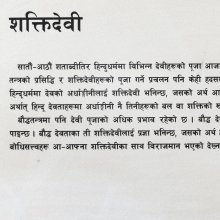Artha: 36 definitions
Introduction:
Artha means something in Buddhism, Pali, Hinduism, Sanskrit, Jainism, Prakrit, the history of ancient India, Marathi, Hindi. If you want to know the exact meaning, history, etymology or English translation of this term then check out the descriptions on this page. Add your comment or reference to a book if you want to contribute to this summary article.
Artha has 34 English definitions available.
Images (photo gallery)
Languages of India and abroad
Sanskrit dictionary
[Deutsch Wörterbuch]
Source: Cologne Digital Sanskrit Dictionaries: Böhtlingk and Roth Grosses Petersburger WörterbuchArtha (अर्थ):—
--- OR ---
Ārtha (आर्थ):—(von artha) adj. f. ī die Sache betreffend (Gegens. śābda) [Sāhityadarpana (1828) 23, 3] [?(ROER 19, 11:] ārthyī). [Hemacandra’s Abhidhānacintāmaṇi 259,] [Scholiast]
--- OR ---
Artha (अर्थ):—
1) kastavārtho yatparasya hetormāmākrośasi [Daśakumāracarita 80, 1.] arthena wegen, mit gen.: kuṇḍalayorarthenābhyāgato smi [Mahābhārata 1, 767.] teṣāmarthena yācāmi tvāham [3, 9939.] —
3) arthānarthānubandhasaṃśayavicāra [Oxforder Handschriften 216,a,7.] [Daśakumāracarita] in [Benfey’ Chrestomathie aus Sanskritwerken 181,1. 2.] patiṃ putraṃ bhrātaraṃ vā ghnantyarthe ghātayanti ca eines Vortheils wegen [Spr. 4371.] —
4) = viṣaya Object der Sinne: svārthena (saha) indriyam (eti) [Varāhamihira’s Bṛhajjātaka S. 75, 3.] —
6) yo bhyarthitaḥ sadbhirasajjamānaḥ karotyartham wer ihre Sache —, ihre Angelegenheit vollbringt [Spr. 4909.] ko rthasteṣāṃ pārthivopāśrayeṇa [318.] —
8) arthāt dem Sinne nach so v. a. das ist, nämlich, scilicet: anantaramadhigataṃ prāptam arthātkaṇvena [] zu [Śākuntala 41.] [Sāhityadarpana 332, 19.] śabdakalpadrumaḥ arthāt etaddeśasthasamastakoṣāśeṣaśāstra [Śabdakalpadruma] auf dem Titelblatte. —
10) lies das Aufhören, Unterbleiben st. Verbot. Als Beispiel führt [KṢĪRASVĀMIN] [?(bei AUFRECHT, Uṇādisūtra Ind.] u. artha) maśakārtho dhūmaḥ Rauch zur Vertreibung der Mücken (gehört natürlich zu 1.) an. —
13) Bez. der Zahl fünf [WEBER, Nakṣ. 2, 382.] —
14) in der Astrol. Bez. des zweiten Hauses, des Hauses des Reichthums (vgl. dhana) [Varāhamihira’s Bṛhajjātaka S. 40, 6. 9. 41, 9.] [BṚH. 4, 10. 9, 5.]
--- OR ---
Ārtha (आर्थ):—lies die Sache —, den Sinn betreffend (Gegens. śābda) . [Oxforder Handschriften 219,b, No. 524.] [Sāhityadarpana 735.] direct (Gegens. śrauta) [649.] ārthatva n. das Verstandenwerden, Gemeintsein [674.]
--- OR ---
Artha (अर्थ):—
3) so v. a. Lohn [Spr. (II) 3587.] —
7) varārthā nach einem Gatten verlangend [Bhāgavatapurāṇa 3, 8, 5.] —
13) (Nachträge) [Sūryasiddhānta 1, 38. 42. 2, 23. 12, 86.]
--- OR ---
Ārtha (आर्थ):—auf Besitz beruhend: saṃbandhāḥ [Patañjali] [?a. a. O.1,122,a.]
Source: Cologne Digital Sanskrit Dictionaries: Sanskrit-Wörterbuch in kürzerer FassungArtha (अर्थ):—m. (in der späteren Sprache) und n. Am Endes eines adj. Comp. f. ā. —
1) Geschäft , Arbeit. artham mit i und gam an eine Arbeit gehen , eine Arbeit treiben. Mit kar arbeiten für (gen.) [191,16.] —
2) Ziel , Zweck. Am Ende eines adj. Comp. so v.a. bezweckend , dienend zu. artham ([Śatapathabrāhmaṇa 14,3,2,21.]) und artha ([Gautama's Dharmaśāstra 20,1]) zum Behuf von , wegen , für , um. arthena mit Gen. , arthāya und arthe mit Gen. oder am Ende eines Comp. dass. —
3) Grund , Veranlassung. —
4) Vortheil , Nutzen , das Nützliche , utile. *Mit Dat. oder Gen. der Person als Wunsch so v.a. möge es ihm zum Vortheil gereichen. —
5) Lohn [Indische sprüche 3587.] —
6) das Zuthunhaben mit , Bedürfen von (Instr.). varārthā der es um einen Gatten zu thun ist [Bhāgavatapurāṇa 3,8,5.] —
7) Gut , Besitz , Reichthum , Vermögen , Geld. —
8) das 2te astrologische Haus , das Haus des Reichthums [Indische studien von Weber 14,314,Śl.18.] —
9) Sache , Gegenstand , Ding , Object. —
10) Sinnesobject. — Daher —
11) Bez. der Zahl fünf. —
12) euphem. penis. —
13) Sache , Angelegenheit. ayam so v.a. dieses [67,26.] akartham was? [39,28.] kaṃ cidartham Etwas [11.] bhāvyartha etwas Zukünftiges [82,18.] avaśyabhāvin was nothwendig erfolgen muss [165,30.] pratipanna etwas Versprochenes [123,16] —
14) gerichtliche Sache , Klage [212,33.213,26.214,12.] —
15) Sinn , Bedeutung. arthāt so v.a. nämlich , scilicet. —
16) *Art und Weise. —
17) *das Aufhören , Unterbleiben. —
18) Preis (fehlerhaft für argha). —
19) personif. als Sohn des Dharma und der Buddhi [Bhāgavatapurāṇa 4,1,51.]
--- OR ---
Ārtha (आर्थ):—Adj. (f. ī) —
1) auf Vortheil beruhend (Verbindungen). —
2) die Sache — , den Sinne betreffend , sachlich. Ein sachliches Gleichniss hat die Form: a gleicht b in Bezug auf Etwas. Dazu Nom.abstr. tva n.
Sanskrit, also spelled संस्कृतम् (saṃskṛtam), is an ancient language of India commonly seen as the grandmother of the Indo-European language family (even English!). Closely allied with Prakrit and Pali, Sanskrit is more exhaustive in both grammar and terms and has the most extensive collection of literature in the world, greatly surpassing its sister-languages Greek and Latin.
See also (Relevant definitions)
Starts with (+444): Ar-tarkon, Artha pala teega, Artha-abhiyukta, Artha-launu, Artha-na-bartha, Artha-vattva, Arthaarthi, Arthaarthim, Arthabandha, Arthabha, Arthabhaj, Arthabhasa, Arthabhava, Arthabhavabha, Arthabhavana, Arthabheda, Arthabhidhana, Arthabhinirvritti, Arthabhipatti, Arthabhiprapana.
Ends with (+706): Abhidheyartha, Abhigitartha, Abhimatartha, Abhineyartha, Abhinitartha, Abhiplutartha, Abhutartha, Abhyartha, Acintyartha, Adbhutartha, Adhididhitibhavartha, Adhigartha, Adhikaranavakyartha, Adhikartha, Adrishtartha, Agitartha, Agnimukhamantrartha, Ahampadartha, Aitareyavakyartha, Aitareyopanishatkhandartha.
Full-text (+1166): Attha, Purushartha, Ityartham, Arthasambandha, Kimartham, Arthashastra, Arthakara, Arthapati, Prayacaka, Arthasamsthana, Arthavisheshana, Arthatas, Arthika, Sphutartha, Arthadushana, Artham, Ityartha, Arthatattva, Arthapatya, Mahartha.
Relevant text
Search found 177 books and stories containing Artha, Ārtha; (plurals include: Arthas, Ārthas). You can also click to the full overview containing English textual excerpts. Below are direct links for the most relevant articles:
Sahitya-kaumudi by Baladeva Vidyabhushana (by Gaurapada Dāsa)
Text 2.3 < [Chapter 2 - The Natures of Words (śabda)]
Text 10.240 < [Chapter 10 - Ornaments of Meaning]
Text 2.8 < [Chapter 2 - The Natures of Words (śabda)]
Rig Veda (translation and commentary) (by H. H. Wilson)
A History of Indian Philosophy Volume 3 (by Surendranath Dasgupta)
Part 7 - Veṅkaṭanātha’s treatment of pramāṇa < [Chapter XX - Philosophy of the Rāmānuja School of Thought]
Part 7 - Māyā and Pradhāna < [Chapter XXII - The Philosophy of Vijñāna Bhikṣu]
Part 12 - Epistemology of the Rāmānuja School according to Meghanādāri and others < [Chapter XX - Philosophy of the Rāmānuja School of Thought]
Garga Samhita (English) (by Danavir Goswami)
Verse 5.1.25 < [Chapter 1 - Advice to Kaṃsa]
Verse 1.5.7 < [Chapter 5 - The Lord’s Appearance]
Verse 6.10.33 < [Chapter 10 - In the Description of the Gomatī River, the Glories of Cakra-tīrtha]
Puranic encyclopaedia (by Vettam Mani)
Related products







